GALLUP NEWS SERVICE
PRINCETON, NJ -- For those who believe that nuclear families are foundational for successful outcomes in society, the statistics on black marriage in the United States are a major concern, or what the African American Healthy Marriage Initiative, calls "crisis-level." As a result, there are numerous projects in the African American community trying to promote marriage and encouraging couples to stay together.
While the actual numbers may look grim for the future of marriage among blacks, Gallup's annual Minority Rights and Relations survey offers the affirmative finding that blacks still psychologically embrace marriage as an important institution. Half of blacks in America say it is very important for couples to marry when they have a child, and two thirds say getting married is very important for couples when they plan to spend their lives together. In both of these instances, these are higher percentages than in the white community.
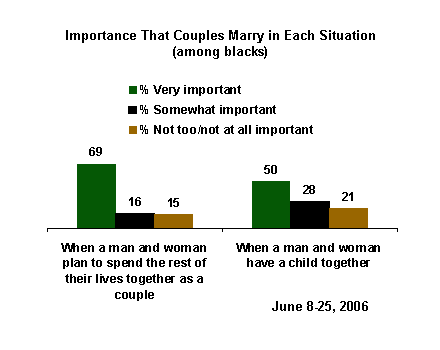
Faced with a marriage crisis, the black community may find the solution to be straightforward: promote advanced education. The rate of marriage increases significantly as blacks' level of education increases, while education makes little difference in marriage rates among whites or Hispanics. Among those with no college education, only 28% of blacks are currently married, compared with 57% of Hispanics and 63% of whites. Among those with college educations, 55% of blacks are married, compared to 57% of Hispanics and 65% of whites.
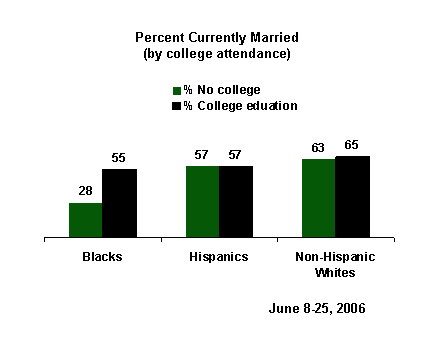
The overall disparity in marriage between whites and blacks is accentuated by the fact that only 43% of blacks in this Gallup Poll sample have a college education, compared with 62% of whites.
The Marriage Disparity
According to the June 8-25 survey, blacks are less likely than whites to be currently married (41% vs. 65%) or to have been raised in a two-parent household (56% vs. 80 %). Also, only three quarters of Blacks, compared with virtually all whites, say their parents were married when they were born.
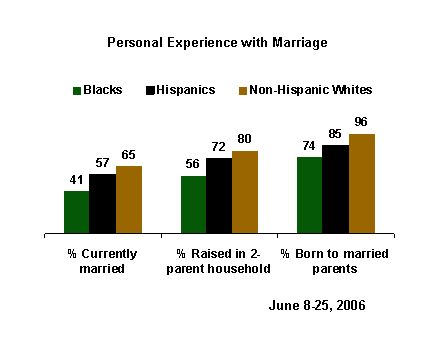
Twice as many blacks as whites (29% vs. 15%) say they were raised mainly by their mother. One in every twelve blacks (8%), compared with just 2% of whites, was raised by an extended family member, such as a grandparent or aunt.
Nevertheless, or perhaps because of their experiences, blacks are more likely than whites (69% vs. 51%) to say it is very important for committed couples to marry.
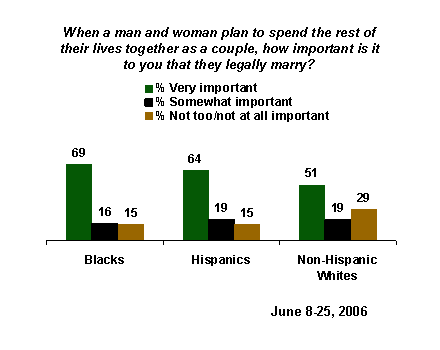
Blacks are just as likely, if not slightly more likely, than whites to say getting married is very important when a couple has a child together. Hispanics are most likely to hold this view.
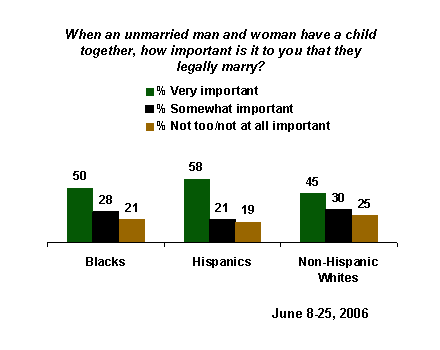
Additional Findings
Marriage Perpetuates Itself
It appears that attitudes towards marriage are related to one's own personal life experiences.
Marriage is most highly valued by those who are currently married and those who were raised by both parents. Sixty-percent of married adults, compared with 45% of those not currently married, say getting married is very important for a couple that plans to spend the rest of their lives together. Fifty-one percent of adults raised by both parents in the same household, compared with 37% of those raised by only one parent, say getting married is very important when a man and woman have a child together.
College Educated Blacks Uniquely Pro-Marriage
Among whites and Hispanics, having a college education is associated with attaching less importance to marriage, but this is not the case among blacks. College educated blacks are more likely than non-college blacks (55% vs. 45%) to say getting married is very important when a couple has a child together. As a result, college educated blacks sharply differ from their white counterparts in the importance they attach to marriage in this circumstance (55% vs. 37%).
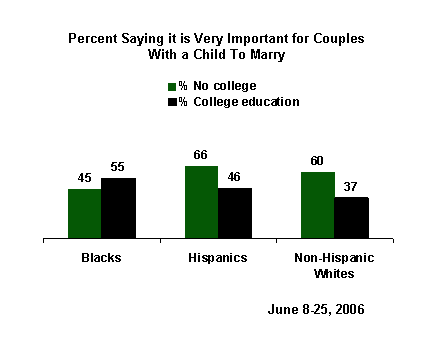
Black Men Subdued on Marriage
Among Hispanics and Whites, Gallup finds men more likely than women to say marriage is very important when the couple has a child, but the reverse is true among blacks.
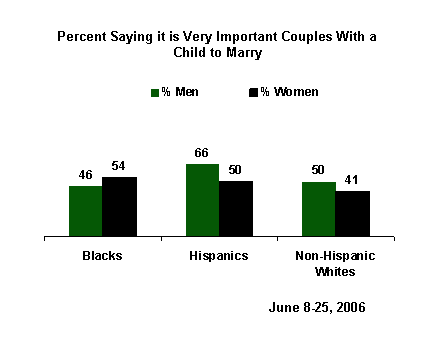
The gender gap among blacks is even wider in the perceived importance of getting married when a couple plans to spend the rest of their lives together. Three quarters of black women say this is very important, compared with 63% of black men.
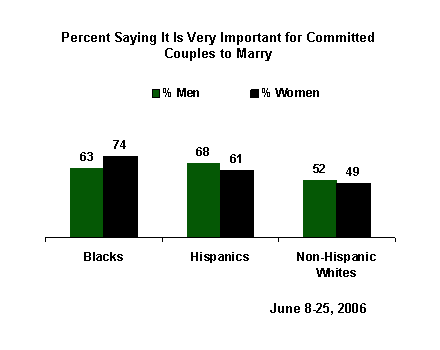
Generational Slippage
Young adults are less likely to say getting married is very important than are middle aged adults and seniors. But, this generational gap is no greater within the black community than it is among Hispanics or whites.
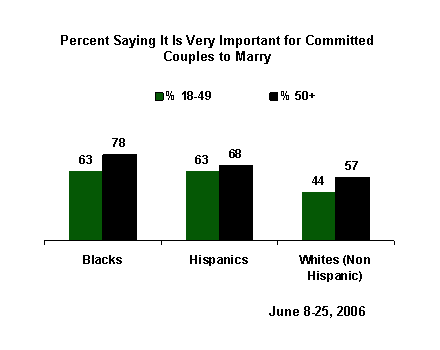
Survey Methods
Results are based on telephone interviews with -2,032- National Adults, aged 18 and older, conducted June 8-25, 2006, including oversamples of Blacks and Hispanics that are weighted to reflect their proportions in the general population. For results based on the total sample of National Adults, one can say with 95% confidence that the maximum margin of sampling error is ±6 percentage points.
Results for the sample of -872-non-Hispanic whites, aged 18 and older, are based on telephone interviews conducted June 8-25, 2006. For results based on the total sample, one can say with 95% confidence that the margin of sampling error is ±7 percentage points.
Results for the sample of -500-blacks, aged 18 and older, are based on telephone interviews conducted June 8-25, 2006. For results based on the total sample, one can say with 95% confidence that the margin of sampling error is ±7 percentage points.
Results for the sample of -506-Hispanics, aged 18 and older, are based on telephone interviews, conducted June 8-25, 2006. For results based on the total sample, one can say with 95% confidence that the margin of sampling error is ±7 percentage points. (167 out of the 506 interviews with Hispanics were conducted in Spanish).
Results for the sample of -811-men, aged 18 and older, are based on telephone interviews conducted June 8-25, 2006. For results based on the total sample, one can say with 95% confidence that the margin of sampling error is ±9 percentage points.
Results for the sample of -1,221-women, aged 18 and older, are based on telephone interviews conducted June 8-25, 2006. For results based on the total sample, one can say with 95% confidence that the margin of sampling error is ±7 percentage points.
In addition to sampling error, question wording and practical difficulties in conducting surveys can introduce error or bias into the findings of public opinion polls.
31. When a man and woman plan to spend the rest of their lives together as a couple, how important is it to you that they legally marry - very important, somewhat important, not too important, or not important at all?
|
|
|
|
Not important |
|
|
|
Total |
% |
% |
% |
% |
% |
|
2006 Jun 8-25 |
54 |
19 |
13 |
12 |
1 |
|
|
|
|
|
|
|
|
Non-Hispanic Whites |
|
|
|
|
|
|
2006 Jun 8-25 |
51 |
19 |
16 |
13 |
1 |
|
|
|
|
|
|
|
|
Blacks |
|
|
|
|
|
|
2006 Jun 8-25 |
69 |
16 |
7 |
8 |
* |
|
|
|
|
|
|
|
|
Hispanics |
|
|
|
|
|
|
2006 Jun 8-25 |
64 |
19 |
6 |
9 |
* |
|
* Less than 0.5% |
|||||
32. When an unmarried man and woman have a child together, how important is it to you that they legally marry - very important, somewhat important, not too important, or not important at all?
|
|
|
|
Not important |
|
|
|
% |
% |
% |
% |
% |
|
|
Non-Hispanic Whites |
45 |
30 |
13 |
12 |
* |
|
Blacks |
50 |
28 |
12 |
9 |
1 |
|
Hispanics |
58 |
21 |
9 |
10 |
2 |
|
* Less than 0.5% |
|||||
D14. Which of the following best describes your marital status: currently married, living together with a partner, widowed, divorced, separated or never married?
|
2006 Jun 8-25 |
Total |
Non-Hispanic Whites |
Blacks |
Hispanics |
|
% |
% |
% |
% |
|
|
Currently married |
61 |
65 |
41 |
57 |
|
Living together with a partner |
8 |
9 |
7 |
13 |
|
Widowed |
5 |
6 |
4 |
2 |
|
Divorced |
8 |
6 |
12 |
5 |
|
Separated |
2 |
2 |
6 |
5 |
|
Never married |
15 |
13 |
30 |
18 |
36. Now, thinking back to when you were born, were your parents married, or were they not
married at that time?
|
Yes, married |
No, not married |
No opinion |
|
|
Total |
% |
% |
% |
|
2006 Jun 8-25 |
92 |
8 |
* |
|
|
|
|
|
|
Non-Hispanic Whites |
|
|
|
|
2006 Jun 8-25 |
96 |
3 |
* |
|
|
|
|
|
|
Blacks |
|
|
|
|
2006 Jun 8-25 |
74 |
26 |
* |
|
|
|
|
|
|
Hispanics |
|
|
|
|
2006 Jun 8-25 |
85 |
14 |
* |
|
* Less than 0.5% |
|||
37. When you were a child, were you raised by both of your parents in the same household, by both parents about equally but in different households, raised mainly by your mother, raised mainly by your father, or were you raised by someone else?
|
|
|
Non-Hispanic Whites |
|
|
|
% |
% |
% |
% |
|
|
Both parents in same household |
75 |
80 |
56 |
72 |
|
Raised mainly by mother |
17 |
15 |
29 |
20 |
|
Raised mainly by father |
2 |
3 |
1 |
2 |
|
Grandmother/great grandmother |
2 |
1 |
6 |
1 |
|
Both parents equally, different households |
1 |
1 |
4 |
1 |
|
Grandparents |
1 |
* |
1 |
2 |
|
Aunt/great aunt |
* |
-- |
1 |
* |
|
Someone else |
1 |
* |
1 |
1 |
|
|
|
|
|
|
|
No opinion |
* |
* |
* |
* |
|
* Less than 0.5% |
||||
